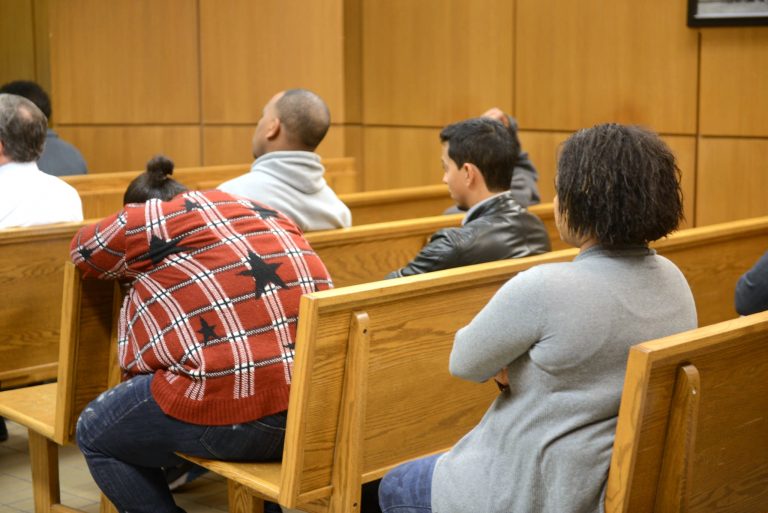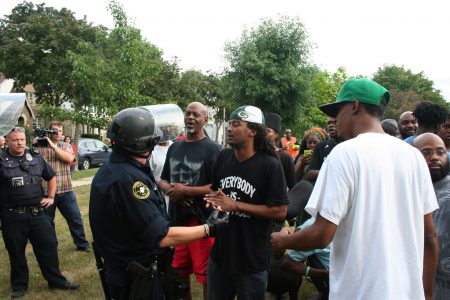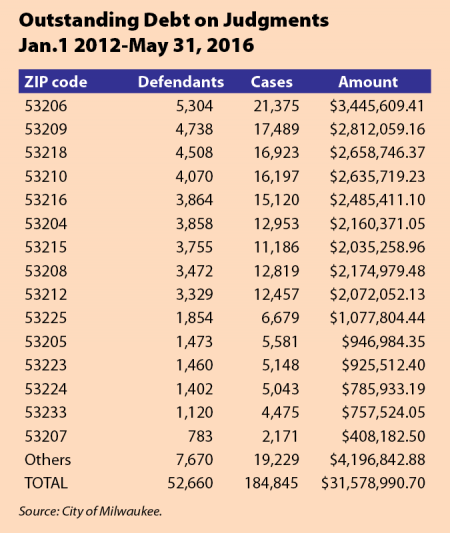Blacks Slammed by Municipal Court Fines
73% of municipal court fines hit city’s African Americans, totals $23 million over four years.

People wait for court proceedings to begin inside a Milwaukee Municipal courtroom. Photo by Sue Vliet.
Milwaukee Municipal Court data obtained by the Wisconsin Justice Initiative (WJI) shows huge racial disparities in the number of defendants, number of cases and the amount of judgments owed to the city as a result of municipal violations. The data spans a 4-1/2 year period, from Jan. 1, 2012 through May 31, 2016.
In 184,845 municipal court cases in which money was owed to the city as of May 31, 73 percent (38,307) of the defendants were African-American. Whites were the next largest group of court debtors; 6,439 owed money. In total, African-Americans owed $23.2 million of the $31.6 million, or 73 percent, in outstanding debt. African-Americans make up 40 percent of Milwaukee’s population.
Most of the defendants were residents of low-income neighborhoods on Milwaukee’s North Side.
The majority of municipal court cases arise from citations issued by the Milwaukee Police Department. The Department of Public Works, Department of Neighborhood Services and other city departments also issue citations.
Hardest hit neighborhoods
The top five ZIP code areas in terms of both defendants and cases are all located on the city’s North Side.
The ZIP code with the most low-income residents, 53206, has a population of about 28,000 and ranked first in the number of cases and defendants. By comparison, the 53215 ZIP code on the city’s South Side has nearly 61,000 residents and ranked seventh in the number of cases and defendants.
Pepper Ray, who works with residents of 53206 and nearby areas in her role as Building Neighborhood Capacities Program coordinator for Amani, said municipal court cases and fines place yet another burden on the residents she serves.
“It’s frustrating because if you don’t pay the fines, warrants are issued for arrest and with that on top of other daily issues, you feel defeated. Like the system ain’t fair,” Ray said.
Fred Royal, president of the Milwaukee NAACP, said the fines are creating more barriers to employment, leading to suspended licenses and incarcerated individuals.
“What the municipal system in the city has done is create a debtors’ court for individuals who are indigent and shouldn’t be assessed these fines in the first place,” Royal said.
Flaws in court system?
The Milwaukee NAACP has been working with the Wisconsin Justice Initiative and other partners to look at the municipal court system. Among the questions is whether judges are informing low-income residents of their right to request an indigence determination, which would allow them to receive an alternative judgment such as community service if they can’t afford to pay a fine.
A March 2016 memo from the U.S. Department of Justice’s Civil Rights Division stated that, “courts must not incarcerate a person for nonpayment of fines or fees without first conducting an indigency determination and establishing that the failure to pay was willful.”

Overpolicing of North Side neighborhoods harms efforts to improve relations between police and the community, according to Milwaukee NAACP President Fred Royal. Photo by Jabril Faraj.
Those indigency determinations are not happening in Milwaukee, according to Gretchen Schuldt, executive director of the WJI. Schuldt recently published a recording of a Milwaukee Municipal Court case before Judge Phillip Chavez in which no oral notice of indigency rights was given. The issue of indigency rights is just one of the many shortcomings of Milwaukee’s Municipal Court system, she said.
On Friday, the Common Council will be voting on a resolution supported by Schuldt, Royal and others that would provide $55,000 to fund legal representation for defendants in municipal court cases. Schuldt said that having an attorney consistently in court to represent defendants would serve as a reminder to judges about their obligation to inform defendants if they qualify for alternative sentences.
“Putting people who can’t afford to pay fines in jail is a violation of their rights,” Schuldt said.
Ald. Terry Witkowski, a member of the city’s Outstanding Debt Task Force, said he is voting against the resolution. Witkowski said defendants already have avenues for representation. These include JusticePoint, which provides financial evaluations to the court to identify individuals who are indigent; facilitates community service referrals; and helps establish links to services such as mental health or addiction treatment for defendants already convicted of municipal ordinance violations.
Witkowski added that when it comes to traffic, parking and other citations, individuals have a choice.
“They’re choosing a behavior that is contrary to what the code or ordinances said and what has been decided on as conduct for society. It’s a matter of ‘don’t get fined in the first place,’” Witkowski said. He argued that the Tax Refund Intercept Program demonstrates that even defendants who live in high-poverty areas have the means to pay fines.
“If they get their taxes intercepted to pay off what’s owed to the city, that’s proof that they do have income,” he added.
Still, he said, it’s not the Common Council’s role to determine who can or cannot pay fines. The job of the task force is to collect what is owed to the city for outstanding citations. He added that he is concerned about the issues that arise when defendants lose their access to a driver’s license, and said he supports a free driver’s education pilot program being offered in some Milwaukee Public Schools.
Community-police relations
That the majority of municipal citations affect low-income African-American neighborhoods undermines efforts to improve relations between law enforcement and community members, according to Royal.
“When you feel like you’re an occupied community you have resentment and anxiety that build up in you, which diminishes the amount of trust you can place on law enforcement,” Royal said.
Policing strategies, such as saturation efforts in high-crime communities are not effective, he added. More effective would be looking into root causes of violence rather than looking at everybody as a potential criminal.
According to Molly Collins, associate director of the ACLU of Wisconsin, Milwaukee policing strategies appear to be disproportionately targeting communities of color, particularly the African-American community. The huge disparity in tickets is the result of concentrated police presence in particular neighborhoods, she said.
Collins said millions of dollars are being removed from communities where the average annual income is often less than $21,000. “It is unfair and unjust to target poor residents of color for multiple and excessive fines that they are often unable to pay.”
The overall number of municipal court cases has fallen 47 percent, from more than 127,000 cases in 2012 to 67,000 in 2015. Total judgments against city residents decreased 38.5 percent, from $16.6 million to $10.2 million during that time period. But the amount of money owed by city residents dropped only 9.4 percent, from $7.25 million in 2012 to $6.57 million in 2015. According to Royal, the decrease in the number of cases can be attributed to fewer traffic citations being issued in the city. That isn’t stopping police from issuing other types of tickets though, he said.
“They still have their hot spot, broken windows theories of policing, which focus on quality-of-life issues,” Royal said.
The end result for defendants is that they are caught up in a flawed municipal court system, according to Schuldt. Resolving those multi-faceted problems will necessitate a response from municipalities, the county, law enforcement and others, she said.
“Fining people isn’t working. Putting them in jail isn’t working. There’s got to be a better way.”
This story was originally published by Milwaukee Neighborhood News Service, where you can find other stories reporting on fifteen city neighborhoods in Milwaukee.
Political Contributions Tracker
Displaying political contributions between people mentioned in this story. Learn more.
- August 24, 2015 - Khalif Rainey received $100 from Fred Royal



















A particular race receiving the majority of muni violations is not itself an indicator of institutional racism. A true indicator of institutional racism would be if a particular race was receiving a higher penalty for the same violations committed by another race. Another would be if a particular race was being cited at a higher rate despite proof of another race not being cited for the same infraction. This article shows neither.
Joe, you’re both right & wrong. There are people that are guilty of crimes, where the punishment is a fine. However, if you’re too poor to pay the fine, technically, you can use community service to pay that fine. In practice, not so much.
So, you have people that are guilty of a crime, but don’t have the financial means to pay their judgement… now they’re guilty of not paying their fines. So, just by being poor, these people now face much larger penalties such as warrants for their arrest, additional fines/jail, and losing their driver’s licence… with all this pushing people towards losing their jobs and other stability in their lives.
The problem is politicians that want to simplify this to “The courts hate black people” or “Just don’t give people fines/jail for breaking the law”.
The cycle of punishment above is not working and the half-assed political solution of no punishment isn’t working either.
Maybe all people should have the option to pay off their fines by earning a credit of minimum wage against their fines, while they volunteer in the same zip code that they commit their crimes. If criminals are making a neighborhood worse with their actions, they can work off their fines by making it better.
I agree with everything you said Tim; I’m not sure how any of that makes me even partially wrong.
Good points Joe. I too was going to point out that the opening statistic of 73% of defendants from 40% of the population alone doesn’t necessarily indicate a problem, nor should the goal be to have those numbers be equal (or the first less than the last), which can be inferred from the presentation.
What does then? How does a society hold itself to higher standards? More specifically, how does a society hold itself to higher standards AND correct for years (generations) of those who didn’t?
I recently had an conversation (ok, an at-times-heated argument) with a homeless man regarding his public urination on my neighbors’ building. I suppose I could’ve called the police and had him fined / arrested for public urination and put him in the statistics behind this article, but that seemed excessive.
What’s basic to me (e.g. use a toilet) was lost upon him. Irrelevant is the fact that he himself doesn’t own property containing a toilet — there are plenty of publicly accessible ones nearby. Our conversation did reveal that he’s not made to feel welcome to use those public toilets.
Maybe this is the “better way”. However, I can only now hope he’ll refrain from urinating on that particular building again, or at least when someone else is in the area.
Joe, it’s seems that you’re arguing that there isn’t de jure institutional racism and I’m saying that there’s de facto institutional racism. What seems lost on the politicians is the solution isn’t in singling out any race for special treatment, it’s treating everyone fairly.
The de facto institutional “racism” you describe is, in reality, just a de facto adverse impact on poor people of any race who get caught in the cycle of inability to comply with muni punishments. Whether one race is more frequently poor than another is yet another step removed from the original topic of this article.
The discussion above is exactly on point on both sides, I believe. However, it is difficult to base that conversation on the data provided in the article. I’d much rather see the total judgments (fines and community service) instead of outstanding debt on judgments. It doesn’t change the basic discussion, but at least gives us a better look at court operations rather than various zip code’s credit worthiness.
I don’t intend to dredge up a cliche, but I really don’t want to argue semantics. I put my solution out there and I’d like to hear others, if anyone has some to offer.
I live in 53209 and we need some stronger regulations. I prefer we put a cameras that catch vehicles crossing through reds at major thoroughfares. Drivers see red, and pause and go through. They should not be on the road. Let the camera be the judge and be deemed racist. In Chicago this problem of fines on poor people that drive erratically is a big issue and became a rallying call to oust Mayor Rahm Emmanual.
I also live in 53209. Speeding is a serious problem. We agree on that Jason. Reckless and inattentive driving is also a serious problem. People talking or texting and driving are as bad as speeders, if not worse, and probably even more prevalent. I wish they’d crack down on that and ticket those people, though it’s probably not as easy to spot as a speeder.